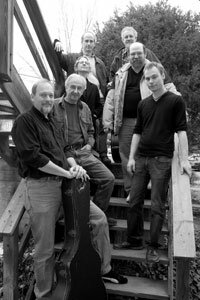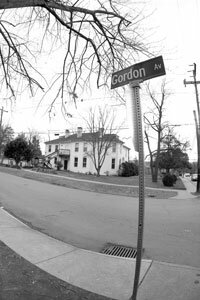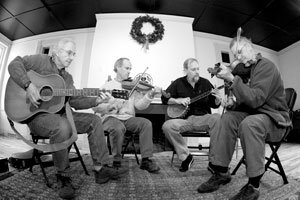COVER- Prism reborn? New group rises from the ashes

"You've got me under your spell again," sang country crooner Buck Owens. And while the late singer may never have made a local appearance, his words seem to sum up the appeal of a beloved UVA-area music establishment that closed amid controversy last year. Now the venue has reopened– although possibly mired in a new controversy.
For 40 years, the Prism Coffeehouse earned a reputation as a premier folk and traditional music venue, playing host to musicians including Emmylou Harris, Doc Watson, and Philip Glass. But after a rift between board members, volunteers, and one mercurial artistic director led to the Prism's 2006 closing, the fate of the historic smoke- and alcohol-free nonprofit venue seemed uncertain. Now, a new coalition of music lovers has formed to bring the music and the masses back to 214 Rugby Road.
But controversy lurks in the familiar music and in a familiar name. A board member of the old Prism Coffeehouse insists the original organization still exists and vows to relaunch. Meanwhile, the board of the new Prism Community Arts Center is moving forward.
Is there room in Charlottesville for both of them, or is the stage set for dueling Prisms?
Good will, long history
For many, the large white house at the corner of Rugby Road and Gordon Avenue will always be known simply as "the Prism," regardless of what organization occupies the building. And that, in part, is what led the 14 new board members of the new Prism to include the word in its name.
"There's great history and good will associated with the Prism," says Jim Childress, one of those members. Another, Marc Perdue, says that using the word "just felt natural."
But Childress, Perdue, and others– some of whom are also former board members of the old Prism Coffeehouse– stress that while the name is similar, the old and new Prisms are "different organizations with different goals."
While the old Prism was a performance-based organization, they say the mission of the new Prism– a coalition of several area music organizations including Blue Ridge Irish Music School, Acoustic Muse, Charlottesville Friends of Old Time Music and fiddle teachers Pete Vigour and Alex Caton– is education.
Besides sponsoring concerts, the new Prism hopes to provide music and dance education and other opportunities for community participation and to build a stronger relationship with UVA's McIntire Department of Music, according to new Prism board member Fred Maus, who serves on the McIntire School faculty. He and other board members predict no confusion between the once and future Prisms.
"There's no cause for anyone to be bothered," says Maus. But "bothered" may be in the eye of the beholder.
"It's only been half a season," says incredulous Prism Coffeehouse board chair Joe Ayers, notified of the new group's name last week. "The Prism is still a viable entity as far as I'm concerned."
Ayers says that after the Prism Coffeehouse lost its contract to buy a new home in Gordonsville and failed to win a renewal of its lease with its Rugby Road landlord, Westminster Church, the board decided to take some time off from promoting concerts to "regroup." Ayers maintains that the nixed Gordonsville deal was a setback but not an organization killer.
"It was just going to be too expensive to do," Ayers explains. "But just because that one deal fell through, they shouldn't assume that an effort to find a location isn't being made."
He's not the only one surprised by the new group's choice of name. Local guitar whiz Jay Pun, who performed at the Prism last year, says he's delighted that music's back in the building.
But "With anything new, you need to start new," says Pun, who liked "Westminster House," the name used to promote several recent concerts at 214 Rugby. He calls the new Prism "a totally different thing," and says the name appropriation leaves "a little bit of a bad taste in my mouth."
The old Prism board has continued to meet monthly, says Ayers, who adds he was "thrilled" that concerts were being held at 214 Rugby Road and had heard that a coalition was forming to keep the shows coming. But no one contacted him about using the word Prism in the name.
"It's very nasty, it seems to me," he says. "Aren't there other names, given all that went on?"
Battle scarred
Although the Prism was started by a group of UVA students in 1966 to provide a friendly community space where musicians and music lovers could gather in harmony, the last several years of the Prism's existence on Rugby Road were steeped in conflict.
As detailed in the Hook's April 1, 2004 cover story, "Prism Schism," numerous Prism board members and volunteers came forward to denounce the way the nonprofit was being run. At fault, they said, was artistic director Fred Boyce. By all accounts an accomplished banjo player who for 15 years had booked the Prism's shows and, with his partner, Kenyon Hunter, handled its finances, Boyce, some claimed, had become verbally abusive and unreceptive to opposing viewpoints.
Meanwhile, the church alleged that there were several months of unpaid rent, and some Prism volunteers and board members began withdrawing their involvement. Amid the schism, evidence of Boyce's temper appeared in the form of a six-minute, expletive-laden answering-machine message he left for one departing board member. Following publication of the story, Boyce's defenders came out swinging in dozens of letters to the Hook accusing Boyce's critics of failing to appreciate his talent and hard work.
"It takes critically important performance venues like the Prism to keep traditional music alive," wrote Jon Lohman, "and these venues wouldn't exist without folks like Fred Boyce and Kenyon Hunter, who have, quite simply, dedicated their lives to this cause."
"They're there to selflessly help the community," added Max Ludington.
The controversy eventually subsided, and the Prism– with a Boyce-friendly board– continued, announcing early in 2006 that it would purchase the former O'Dell's restaurant space in downtown Gordonsville with a plan to move operations. After that deal fell through, Westminster Church declined to renew the Prism's lease, so Boyce and Hunter packed up 40 years of Prism belongings– including old photo albums and recordings of historic shows– and vacated the premises. Boyce and Hunter are not currently living in Charlottesville, says Ayers, and the couple did not respond to an emailed request for comment.
As for the artifacts, Childress says the new Prism has no immediate plans to request their return to the building.
"We would like to have those things," says Childress, "but it's not worth it to me to get into it at the moment. In a way it's nice to have a clean break and go forward to acomplish our mission."
But is using the word Prism in the name the best way to establish a clean break?
"There won't be any problem at all," says attorney Steve Rosenfield, who helped the new Prism file for incorporation. "They're two separate corporate entities that share one word in their names." Rosenfield compares the word Prism to the word "cola."
"Indeed, when you go into a restaurant and ask for a cola," he says, "people ask which one you want. It's not an infringement."
But two other area attorneys the Hook contacted seem to question the wisdom of using the same word in the name.
"That's not a comfortable situation," says intellectual property attorney Sheldon Parker. "Abandonment doesn't happen immediately," he adds, noting that the Prism Coffeehouse could have legal claim to the word Prism for at least two years before it would be considered legally up for grabs. Attorney Jessica Costa agrees.
"If they haven't closed it at the State level, it's still alive," says Costa of the old Prism's registration with the State Corporation Commission, which incorporates businesses.
The Prism Coffeehouse is still a company on record with the SCC, and the new Prism's board chair Childress says the entity was officially incorporated this week as the Prism Community Arts Center. He doesn't expect a problem since the full names are different.
But even though the State Corporation Commission registered the Prism Community Arts Center, that doesn't mean a tug-of-war over the name can't still arise.
"It would be a matter for the courts," says Parker, "which is not where anyone wants to go."
On the upbeat
On a recent cloudy afternoon, a group of new Prism board members– fiddle bows flying, feet tapping– has gathered for an impromptu old time jam session.
"It's exciting," says one when the group breaks. He's Gary Alter, a guitar player who didn't pick up an instrument until his 40th birthday, some 20 years ago. Playing old time music changed his life, he says, and being part of an organization that will help others have that same experience is a prospect he relishes.
For Marc Perdue, who first played on the Rugby road stage in 1976 and spent many hours over the last three decades listening and performing at the old Prism, being part of the new Prism is a way for me to "give back" to the musical community that nurtured him.
Indeed, all the interviewed board members of the new Prism say they hope to focus solely on the excitement surrounding the birth of a new creative organization.
"We do not want to portray ourselves so much in relation to the old Prism Coffeehouse," says Childress, who became involved with that group as a first-year UVA student in 1970. Vigour, whose involvement with the old Prism began in 1974, calls the new Prism a "renaissance," and praises the cooperation of the board and the groups planning to sponsor concerts and other events. In fact, concerts have been continuing in the Prism building for some time. The Blue Ridge Irish Music School took over the lease in July, four months after the Prism Coffeehouse moved out, as a way to hold the space for local music.
"We never intended it to be long term," says School director Lori Madden, who will soon fill the Prism Community Arts Center's only paid position as executive director. The Prism Community Arts Center plans to take over the lease when it expires.
Since the School moved in, several improvements have been made to the building– most noticeably, the floor in the performance room has been replaced to help accommodate frequent dance lessons.
Westminster Church spokesperson James Burch says the church has been delighted with the School and is looking forward to working with the new Prism board. "They're wonderful people," says Burch.
For Acoustic Muse, a nearly 10-year-old local organization that promotes events by singer-songwriters, the new Prism is exciting because it will allow community members a chance to learn the skills they see up on stage.
"We don't do that many shows a year," says Mike Cvetanovich, president of Acoustic Muse and vice president of the new Prism, "but we want our efforts to go to education in traditional arts and dance."
Already, the Center has shows on the calendar, and Vigour says a recent concert by classical guitarist Muriel Anderson (promoted under the name Westminster House) was sold out. On February 1, James Leva takes the stage, and a benefit concert featuring a performance by Perdue's band, Naked Creek, and Vigour's band, Uncle Henry's Favorites, is slated for February 24. Comestibles for that show promise to be tasty: new Prism board member Dave Simpson, owner of the renowned C&O Restaurant, will be providing the treats.
Childress says the Center hopes to raise $25,000 by the summer through concerts and donations in order to begin meeting its mission. So far, he says, response from the public has been positive, with some corporate and individual donations rolling in and others promising support. Among other things, Childress says, the Center needs a new sound system and chairs. (The Charlottesville Pavilion lent some chairs during the off-season, he says, but will need them back in April.)
Old Prism founder Tom Barden, now a professor in Minnesota, says despite potential conflict over the name, he feels a "dim glimmer of hope that The Prism in some form might live on. If it can stay at 214 Rugby Road, even better."
Even the old Prism's Ayers sees a bright spot to the new Prism's name.
"It's a sign of the recognition you're asking for," he says he will tell Boyce. "Most musicians who came to the Prism recognized it was a good job for them."
Several board members of the new Prism say they hope musicians will continue to fill 214 Rugby, and while they know they'll face challenges, there's one thing Childress says they must do: "figure out how we can create a place that really is a community organization where people feel included and have a voice."

Prism Community Arts Center board members (clockwise from bottom left) Marc Perdue, Gary Alter, executive director Lori Madden, Jim Childress, Pete Vigour, Mike Cvetanovich, and Cleek Schrey
PHOTO BY WILL WALKER

Music returns to 214 Rugby Road.
PHOTO BY WILL WALKER

Gary Alter, Jim Childress, Marc Perdue, and Pete Vigour jam on the stage at the new Prism Community Arts Center.
PHOTO BY WILL WALKER

Fred Boyce and Kenyon Hunter
FILE PHOTO BY MITCHELL JARRETT
#
3 comments
Is that building on your cover on fire?
Wonderful news to read about the Prism Community Arts Center going full steam ahead! We will revel in the music when we get across the pond again.
Sending an Northwest England sort of compliment to all:
"Well done you!"
I hope some of the instructors under the new 'Prism' decide to pay their tutoring fees to the organization instead of withholding their money from the organization like some of the others in the earlier Prism incarnation.